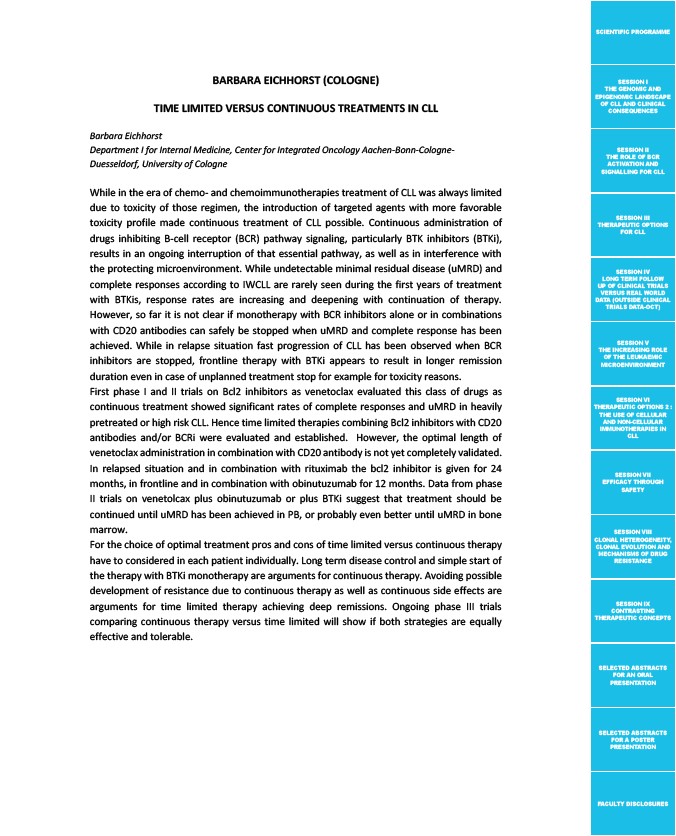
SCIENTIFIC PROGRAMME
SESSION I
THE GENOMIC AND
EPIGENOMIC LANDSCAPE
OF CLL AND CLINICAL
CONSEQUENCES
SESSION II
THE ROLE OF BCR
ACTIVATION AND
SIGNALLING FOR CLL
SESSION III
THERAPEUTIC OPTIONS
FOR CLL
SESSION IV
LONG TERM FOLLOW
UP OF CLINICAL TRIALS
VERSUS REAL WORLD
DATA (OUTSIDE CLINICAL
TRIALS DATA-OCT)
SESSION V
THE INCREASING ROLE
OF THE LEUKAEMIC
MICROENVIRONMENT
SESSION VI
THERAPEUTIC OPTIONS 2 :
THE USE OF CELLULAR
AND NON-CELLULAR
IMMUNOTHERAPIES IN
CLL
SESSION VII
EFFICACY THROUGH
SAFETY
SESSION VIII
CLONAL HETEROGENEITY,
CLONAL EVOLUTION AND
MECHANISMS OF DRUG
RESISTANCE
SESSION IX
CONTRASTING
THERAPEUTIC CONCEPTS
SELECTED ABSTRACTS
FOR AN ORAL
PRESENTATION
SELECTED ABSTRACTS
FOR A POSTER
PRESENTATION
FACULTY DISCLOSURES
BARBARA EICHHORST (COLOGNE)
TIME LIMITED VERSUS CONTINUOUS TREATMENTS IN CLL
Barbara Eichhorst
Department I for Internal Medicine, Center for Integrated Oncology Aachen-Bonn-Cologne-
Duesseldorf, University of Cologne
While in the era of chemo- and chemoimmunotherapies treatment of CLL was always limited
due to toxicity of those regimen, the introduction of targeted agents with more favorable
toxicity profile made continuous treatment of CLL possible. Continuous administration of
drugs inhibiting B-cell receptor (BCR) pathway signaling, particularly BTK inhibitors (BTKi),
results in an ongoing interruption of that essential pathway, as well as in interference with
the protecting microenvironment. While undetectable minimal residual disease (uMRD) and
complete responses according to IWCLL are rarely seen during the first years of treatment
with BTKis, response rates are increasing and deepening with continuation of therapy.
However, so far it is not clear if monotherapy with BCR inhibitors alone or in combinations
with CD20 antibodies can safely be stopped when uMRD and complete response has been
achieved. While in relapse situation fast progression of CLL has been observed when BCR
inhibitors are stopped, frontline therapy with BTKi appears to result in longer remission
duration even in case of unplanned treatment stop for example for toxicity reasons.
First phase I and II trials on Bcl2 inhibitors as venetoclax evaluated this class of drugs as
continuous treatment showed significant rates of complete responses and uMRD in heavily
pretreated or high risk CLL. Hence time limited therapies combining Bcl2 inhibitors with CD20
antibodies and/or BCRi were evaluated and established. However, the optimal length of
venetoclax administration in combination with CD20 antibody is not yet completely validated.
In relapsed situation and in combination with rituximab the bcl2 inhibitor is given for 24
months, in frontline and in combination with obinutuzumab for 12 months. Data from phase
II trials on venetolcax plus obinutuzumab or plus BTKi suggest that treatment should be
continued until uMRD has been achieved in PB, or probably even better until uMRD in bone
marrow.
For the choice of optimal treatment pros and cons of time limited versus continuous therapy
have to considered in each patient individually. Long term disease control and simple start of
the therapy with BTKi monotherapy are arguments for continuous therapy. Avoiding possible
development of resistance due to continuous therapy as well as continuous side effects are
arguments for time limited therapy achieving deep remissions. Ongoing phase III trials
comparing continuous therapy versus time limited will show if both strategies are equally
effective and tolerable.